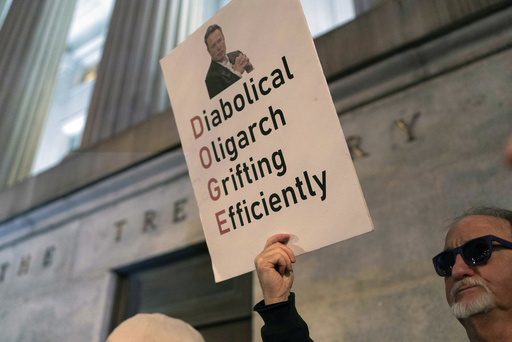WASHINGTON — The rise of Elon Musk as a key figure in the Trump administration has created a remarkable scenario: a White House advisor harnessing the influence of one of the globe’s most potent social media platforms to communicate government messaging while simultaneously undermining critics.
In recent events, Musk has leveraged his platform to advocate for Trump’s policies to his 215 million followers, labeling an agency he intends to dismantle as “evil” and accusing a Treasury employee, who resigned under pressure regarding payment system access, of criminal activity. His activities on the platform he owns have become a significant means of communication for the Republican administration, enhancing his ability to sway public opinion as more Americans increasingly rely on social media for news updates.
Being classified as a special government employee allows Musk to circumvent some of the ethics and financial disclosure requirements imposed on other federal officials. This week, Trump brushed aside concerns surrounding Musk’s potential conflicts of interest, asserting, “Where we think there’s a conflict or there’s a problem, we won’t let him go near it.”
Political scientist Steven Levitsky from Harvard remarked on Musk’s extraordinary control over such a vital channel of communication, deeming it “unthinkable” in the context of today’s governmental systems. He commented that this unprecedented intertwining of economic, media, and political power has never been witnessed in any democracy across the globe.
Efforts to gain feedback from Musk’s special commission, the Department of Government Efficiency, and X have gone unanswered.
Musk’s unique position intertwines two influential realms—a connection that faces criticism not only for amplifying Trump’s messages but also for his financial motivation to prioritize his social media platform for disseminating crucial government information.
During the initial fortnight of Trump’s presidency, Musk utilized his celebrity status to enhance the narrative surrounding various issues like California wildfires, federal expenditures, and cabinet selections among others. He has employed X to critique and exert pressure on opponents of his extensive governmental restructuring as the head of DOGE.
Furthermore, Musk hosted a livestream on X featuring fellow entrepreneur Vivek Ramaswamy along with two Republican senators to discuss DOGE’s initiatives, inviting followers to participate in real-time. Just twelve hours later, the recorded session was made available on Facebook for those not on X.
Trump’s interest in the smaller social media platform Truth Social—transferred to a revocable trust under his sole control—demonstrates another instance of concentrated power.
Musk maintains that his X communications regarding DOGE and other government matters aim to promote transparency. Supporters commend him for sharing direct and unfettered thoughts, seeing it as a refreshing shift from past governmental secrecy.
He has committed to ensuring that DOGE publishes all of its actions online; however, the official commission website remains barren, displaying only the slogan, “The people voted for major reform.”
Amplifying Trump’s narratives has become Musk’s routine since joining the administration. His platform remains the most followed X account, often recommended to new users. However, some of the shared narratives have been misleading. After notable wildfires in Los Angeles, Musk tweeted a claim stating, “TRUMP UNLEASHES CALIFORNIA’S WATER,” criticizing Biden and Newsom for allowing the fires to persist.
While the Army Corps of Engineers did release significant water flows from two California reservoirs, this action was directed towards farmland and not the neighborhoods impacted by the wildfires. Moreover, the timing of this release didn’t align with the farmers’ needs.
In December, before Trump assumed office, Musk played a role in derailing a government funding agreement by inciting outrage on X about excessive spending. More recently, Musk has been vocal about shutting down the U.S. Agency for International Development (USAID), labeling it as “evil” and a “criminal organization.”
Additionally, Musk has suggested that others may have engaged in criminal activity from his West Wing office, creating implications of administrative endorsement. After Treasury’s acting deputy secretary resigned, Musk claimed the official had engaged in crimes surpassing those of organized crime. The legality of these allegations remains ambiguous.
At least one prosecutor appointed by Trump seems willing to act on tips from Musk’s platform. Interim U.S. Attorney Ed Martin acknowledged a pro-Trump X account for recommending that he investigate a user who criticized DOGE.
Just days ago, Musk declared online that he had “deleted” a government agency that oversaw projects like the IRS Direct File program, leading to confusion over the program’s availability to taxpayers, though it is set to continue for the upcoming tax season.
Critics argue that instead of fostering full transparency, Musk selectively reveals information about the commission he leads. He has banned X users who disclosed the identities of DOGE team members, and essential details about the commission’s initiatives, including its significant database control and access to the U.S. Treasury payment system, remain obscure, all without congressional endorsement.
As Musk’s influence grows in the Trump administration, other CEOs leading major social media firms have also tended to cater to the president’s policies. Meta CEO Mark Zuckerberg, Google CEO Sundar Pichai, and TikTok CEO Shou Zi Chew have all engaged with Trump during his presidency, with Zuckerberg recently modifying platform policies in response to Trump’s critiques about censorship.
In this environment, the future of TikTok in the U.S. hinges on potential new ownership, with Trump taking an active role in negotiating that transition, even suggesting a governmental stake could be considered.
Steven Livingston, director of the Institute for Data, Democracy & Politics at George Washington University, critiques Musk’s influence as indicative of faltering American democracy, stating that it bends to the will of billionaires rather than Congress. He pondered, “Where does X and Elon Musk end and the government begin? It’s becoming increasingly unclear.”




